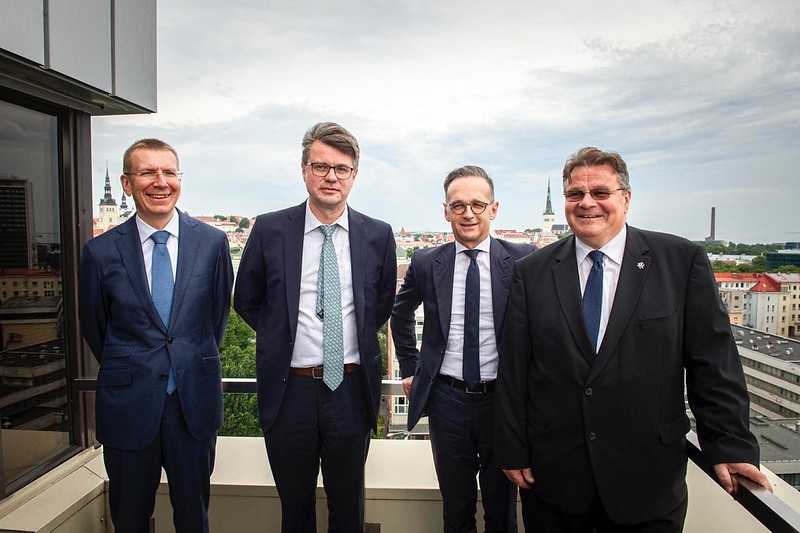On 20 July 2020, the Minister of Foreign Affairs, Edgars Rinkēvičs, took part in the annual meeting of the Ministers of Foreign Affairs of the Baltic States and Germany. The Latvian Foreign Minister, together with the Minister of Foreign Affairs of Estonia, Urmas Reinsalu; the Minister of Foreign Affairs of Lithuania, Linas Linkevičius; and the German Federal Minister for Foreign Affairs, Heiko Maas, discussed issues of current importance for the European Union, NATO and European security, and topics on the international agenda.
Edgars Rinkēvičs expressed support for the priorities set by the German presidency of the Council of the EU, commending the focus on the European Green Deal, digitalisation and the rule of law, as well as the intention of strengthening the Single Market.
The Latvian Foreign Minister underlined that Germany is an important strategic partner to Latvia and the Baltic region, and he thanked Germany for its noteworthy contributions to NATO’s collective defence and in strengthening security of the Baltic region. Although overcoming the COVID-19 crisis is a priority and the main challenge, we must return to a regular EU agenda, Edgars Rinkēvičs said. Latvia supports Germany’s priorities in the field of cyber security. The EU has a number of cyber diplomacy tools at its disposal, and their use must be enhanced, the Foreign Minister noted.
The meeting of the Baltic and German Foreign Ministers also addressed the Eastern Partnership (EaP) policy, latest developments in relations with Russia and China, as well as the dialogue with Turkey. The Minister called for launching timely preparations for the EaP summit as well as setting the strengthening of resilience of partner countries to internal and external challenges as one of the central tasks for the EaP cooperation during the next period. Referring to the situation in the Middle East and North Africa, the Minister expressed concerns about the increasing interplay between the conflicts in Syria and Libya.
In the near future, no positive tendencies can be expected in the foreign policy or domestic policy of Russia, since Russia regards the West as its enemy in foreign policy and makes attempts to reassert its influence on the global stage by trying to divide the West, Edgar Rinkēvičs underlined. Therefore it is vital to preserve European unity, and we support Germany’s efforts in the context of the Minsk agreements. We also find unacceptable Russia’s revisionist approach to historical issues, especially the events of World War II and denial of the occupation of the Baltic States. Russia’s attempts at distorting historical facts and downplaying the gravity of crimes perpetrated by the Soviet totalitarian regime are dangerous elements in the information war geared toward creating divisions in Europe, stressed Edgars Rinkēvičs.
On 20 July the Baltic States’ Foreign Ministers also had an online conversation with the Acting Foreign Minister of Albania, Gent Cakaj. Edgars Rinkēvičs welcomed the EU’s decision to begin accession negotiations with Albania and North Macedonia, and underlined the importance of this decision for the entire Balkans region.





